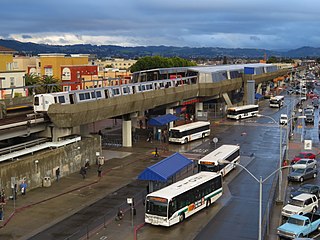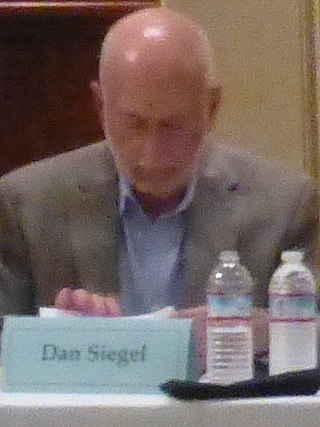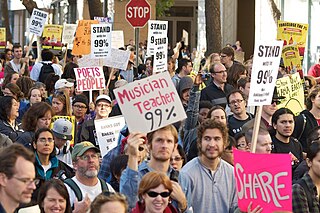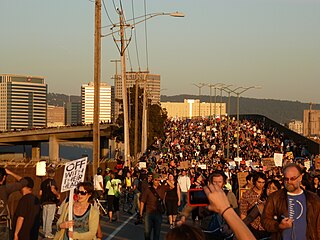Related Research Articles

Oakland is the most populous city in and the county seat of Alameda County, California, United States. A major West Coast port, Oakland is the largest city in the East Bay region of the San Francisco Bay Area, and the third-largest city overall in the Bay Area. With a population of 440,646 in 2020, it serves as the Bay Area's trade center: the Port of Oakland is the busiest port in Northern California, and the fifth- or sixth-busiest in the United States. A charter city, Oakland was incorporated on May 4, 1852, in the wake of the state's increasing population due to the California gold rush.

Fruitvale station is a Bay Area Rapid Transit (BART) station located in the Fruitvale District of Oakland, California. The elevated station has two side platforms. The station is served by the Orange, Green, and Blue lines.
Jingletown is a pocket arts community in Oakland, California, adjacent to the Oakland Estuary, and about two miles southeast of Lake Merritt. It is bounded by the Coast Guard Island Bridge and Fruitvale Bridges, which connect Oakland to the City of Alameda. It is part of the area called Fruitvale in East Oakland. Many working artists live in converted lofts that are common in the area.

Daniel Mark Siegel is a civil-rights attorney at the Oakland-based law firm Siegel, Yee, Brunner & Mehta, former legal adviser to Oakland Mayor Jean Quan, and candidate in the 2014 Oakland mayoral race. He specializes in employment and labor law.

John A. Russo is a former American politician, city attorney, and city manager with municipal management experience in four cities in the state of California.

Oscar Grant III was a 22-year-old African-American man who was killed in the early morning hours of New Year's Day 2009 by BART Police Officer Johannes Mehserle in Oakland, California. Responding to reports of a fight on a crowded Bay Area Rapid Transit train returning from San Francisco, BART Police officers detained Grant and several other passengers on the platform at the Fruitvale BART Station. BART officer Anthony Pirone kneed Grant in the head and forced Grant to lie face down on the platform. Mehserle drew his pistol and shot Grant. Grant was rushed to Highland Hospital in Oakland and pronounced dead later that day. The events were captured on bystanders’ mobile phones. Owners disseminated their footage to media outlets and to various websites where it went viral. Both protests and riots took place in the following days.
John Leonard Burris is an American civil rights attorney, based in Oakland, California, known for his work in police brutality cases representing plaintiffs. The John Burris law firm practices employment, criminal defense, DUI, personal injury, and landlord tenant law.

Carole Ward Allen is an American politician, professor, and political consultant. She is a member of the Democratic Party, and serves as the chief executive officer of CWA Partners, LLC. As a mass transportation executive in the State of California, Ward Allen served three four-year terms as an elected member of the San Francisco Bay Area Rapid Transit District Board of Directors representing the 4th district from 1998 until 2010.

Lai Jean Quan is an American politician who was the 49th mayor of Oakland, California from 2011 to 2015. She previously served as City Council member for Oakland's 4th District. Upon inauguration on January 3, 2011, she became Oakland's first female mayor. Quan ran an unsuccessful campaign for reelection in 2014, losing the mayoral race to Libby Schaaf, a member of the Oakland City Council.
Crime in Oakland, California began to rise during the late 1960s after the King assassination riots, and by the end of the 1970s Oakland's per capita murder rate had risen to twice that of San Francisco or New York City. In 1983, the National Journal referred to Oakland as the "1983 crime capital" of the San Francisco Bay Area. Crime continued to escalate during the 1980s and 1990s, and during the first decade of the 21st century Oakland has consistently been listed as one of the most dangerous large cities in the United States.

Occupy Oakland refers to a collaboration and series of demonstrations in Oakland, California, that started in October 2011. As part of the Occupy movement, protesters have staged occupations, most notably at Frank H. Ogawa Plaza in front of Oakland City Hall.

The following is a timeline of Occupy Oakland which began on Monday, October 10, 2011, as an occupation of Frank H. Ogawa Plaza located in front of Oakland City Hall in downtown Oakland, and is an ongoing demonstration. It is allied with Occupy Wall Street, which began in New York City on September 17, 2011, and is one of several "Occupy" protest sites in the San Francisco Bay Area. Other sites include Occupy San Francisco and Occupy San Jose.

Delphine Allen et al. v. City of Oakland was a civil rights lawsuit in Federal District Court regarding police misconduct in Oakland, California which has resulted in ongoing Federal oversight. Plaintiffs alleged mistreatment at the hands of four veteran officers, known as the "Riders", who were alleged to have kidnapped, planted evidence, and beaten citizens. Plaintiffs also alleged that the Oakland Police Department (OPD) turned a blind eye to police misconduct.

William Horsley Orrick III is an American lawyer who serves as a senior United States district judge of the United States District Court for the Northern District of California. He had a long career as a lawyer in private practice in San Francisco, and served as a Deputy Assistant Attorney General in the Civil Division of the United States Department of Justice during the Obama administration.

Barbara Parker is city attorney of Oakland, California.

Fruitvale Station is a 2013 American biographical drama film written and directed by Ryan Coogler. It is Coogler's feature directorial debut, and is based on the events leading to the death of Oscar Grant, a young man killed in 2009 by Bay Area Rapid Transit (BART) police officer Johannes Mehserle at the Fruitvale district station in Oakland, California. The film stars Michael B. Jordan as Grant, with Kevin Durand and Chad Michael Murray playing the two BART police officers involved in Grant's death, although their names were changed for the film. Melonie Diaz, Ahna O'Reilly, and Octavia Spencer also star.
The Chief of the Oakland Police Department is an office held by the executive head and highest-ranking officer of the Oakland Police Department. The chief was first established in 1853. The chief manages and oversees the planning, development and implementation of all law enforcement and crime prevention programs for the City. She provides leadership, vision and direction to the Department and its command staff and promotes collaboration, communication and coordination with other city agencies and community organizations.
Sean Whent was the Chief of the Oakland Police Department. Whent was appointed Interim Chief by Mayor Jean Quan in May 2013, replacing Anthony Toribio, who served for only two days following Howard Jordan's resignation. Whent was permanent (non-interim) police chief from May 2014 to June 2016.

The history of Oakland, a city in the county of Alameda, California, can be traced back to the founding of a settlement by Horace Carpentier, Edson Adams, and Andrew Moon in the 19th century. The area now known as Oakland had seen human occupation for thousands of years, but significant growth in the settlements that are now incorporated into the city did not occur until the Industrial Revolution. Oakland was first incorporated as a town in 1852.

The 2014 Oakland mayoral election was held on November 4, 2014 to elect the mayor of Oakland, California. It saw the election of Libby Schaaf, who unseated incumbent mayor Jean Quan.
References
- 1 2 Kuruvila, Matthai (19 February 2010). "Oakland police seek injunction against gangs". San Francisco Chronicle . Hearst Communications . Retrieved 9 February 2024.
- 1 2 Berton, Justin (May 28, 2010). "Judge signals OK for Oakland gang injunction". San Francisco Chronicle . Hearst Communications . Retrieved 9 February 2024.
- 1 2 "Preliminary Injunction Issued Against 5 Alleged Oakland Gang Members". CBS Bay Area . CBS. 24 June 2011.
- 1 2 "Judge Approves 2nd Oakland Gang Injunction". CBS Bay Area . CBS. 25 February 2012.
- ↑ Walter, Shoshana (14 November 2010). "Raw Statistics Belie a Crackdown on Gangs". The New York Times. The New York Times Company . Retrieved 9 February 2024.
- 1 2 Artz, Matthew (5 March 2015). "Oakland dismisses gang injunctions it fought hard to secure". The Mercury News . MediaNews Group . Retrieved 9 February 2024.
- 1 2 "Oakland Dropping Controversial Gang Injunction; Included Curfew, Banned Wearing Certain Colors". CBS Bay Area . CBS Broadcasting. 6 March 2015.
- ↑ "Gang Injunction to Continue in Oakland". NBC Bay Area . NBCUniversal Media. Bay City News. May 18, 2011. Retrieved 9 February 2024.
- 1 2 Stelzer, Andrew (2 June 2012). "The Fight Over Gang Injunctions". Los Angeles Daily Journal . Daily Journal Corporation . Retrieved 9 February 2024.
- ↑ Kwamilele, Tasion (12 October 2011). "Controversy further stoked as Oakland considers new injunctions". Oakland North. UC Berkeley Graduate School of Journalism . Retrieved 9 February 2024.
- ↑ "Opposition builds against Oakland gang injunctions". San Francisco Bay View . Dr. Willie and Mary Ratcliff. Indybay. 7 May 2010. Retrieved 9 February 2024.
- ↑ "Some residents skeptical about Oakland gang injunctions". ABC7 San Francisco. ABC7 San Francisco. 14 October 2010. Retrieved 9 February 2024.
- 1 2 Bulwa, Demien (23 February 2011). "Oakland gang injunction opponents fight 2 battles". San Francisco Chronicle . Hearst Communications . Retrieved 9 February 2024.
- 1 2 Burt, Cecily (8 November 2011). "Report: North Oakland gang injunction has not reduced violent crime". The Mercury News . MediaNews Group . Retrieved 9 February 2024.
- ↑ Wagstaff, Evan (10 June 2011). "Oakland Mayor and Gang Policy Mix Uneasily". The New York Times . The New York Times Company . Retrieved 9 February 2024.
- ↑ Lee, Henry K. (23 June 2014). "Oakland's gang injunction upheld". San Francisco Chronicle . Hearst Communications . Retrieved 9 February 2024.
- ↑ Queally, James (8 July 2018). "California moving away from gang injunctions amid criticism, falling crime rates". Los Angeles Times . California Times. Retrieved 9 February 2024.